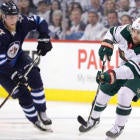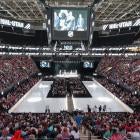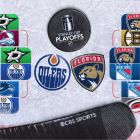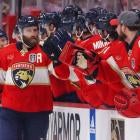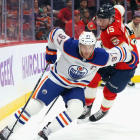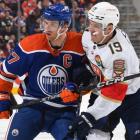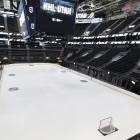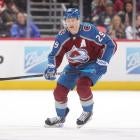The Minnesota Wild are dead.
The Wild's playoff run came to a close in Winnipeg on Friday night, as the Jets torched them for a 5-0 win to close out the opening round series four games to one. For Minnesota, it's the latest in what has become a long line of postseason disappointments, and this one was tough to watch as the Wild were completely outmatched in this series.
Let's look at where things went wrong.
The Jets' relentless attack
We all knew the Jets held the offensive advantage coming into this series. They finished second only to the Lightning in scoring during the regular season, and Winnipeg has a bunch of weapons on the front end of their lineup.
But man was the ice ever tilted throughout most of this series. The Jets dominated possession, often pinning the Wild in their own end for extended periods of time. Winnipeg ended up owning 59 percent of the series' total shot attempts at 5v5 and, as a result, they held a significant advantage in scoring chances as well (93-68 at 5v5 and 150-107 total).
Not only that, their top talent produced when presented with those opportunities.
Mark Scheifele (four goals and an assist) and Dustin Byfuglien (five assists) led the team in points, while Patrik Laine, Paul Stastny and Blake Wheeler also provided four points each.
Patrik Laine’s first career playoff goal pic.twitter.com/odxA7hSUfC
— Pete Blackburn (@PeteBlackburn) April 12, 2018
But it wasn't solely Winnipeg's stars who made a difference in this series, nor were the contributions on the score sheet the only ones of value.
Minnesota's trouble with breakouts
When the Wild weren't pinned in their own zone watching the Jets run wild, they were struggling to find clean breakouts and entries into the offensive end. It felt like the Wild were constantly turning the puck over in the neutral zone, which not only killed their own attack, but also led to excellent chances for Winnipeg.
While that can be chalked up to failed execution and poor adjustments behind the bench, you also have to give credit to the Jets' ability to get pressure on the puck. They swarmed Minnesota's puck carriers and forced them into bad decisions.
For as much skill and talent as Winnipeg has in their top six, they also have plenty of speed and toughness to round out the lineup. It seemed like regardless of who was on the ice for Winnipeg, they were able to sustain pressure by grinding it out, racing to loose pucks and throwing the body around.
The Wild didn't have much time to operate with the puck before there was at least one Jets player in their face ready to battle. As a result, it was really difficult for the Wild to get anything going in the way of offense. Aside from a six-goal explosion in Game 3 -- a legitimate anomaly in this series -- the Wild only managed to score three goals in four games.
The Wild failed to show up in Game 5
Straight up: The Wild produced a nice, wet, stinky turd to close out this series.
Sometimes you get to see what a team is truly made of when their backs are up against the wall, and if that's the case for the Wild -- well, let's just say that management might want to consider making some serious changes this offseason.
With no room error, the Wild came into that final game on Friday night and immediately surrendered a goal on the first shot of the game, just 31 seconds into the first period. With that goal coming on Winnipeg's home ice, in front of a raucous crowd that has been longing for a Jets' postseason series win since hockey returned to the city, well ... the Wild didn't do themselves any favor by letting the Jets feed off that energy.
You could almost see it in Bruce Boudreau's face after that first goal. He knew his team was in trouble.
Things only got worse from there as the Jets continued to run over Minnesota, scoring four goals on their first 10 shots and chasing Devan Dubnyk out of the Wild net just twelve minutes into the game. That's not to say it was entirely Dubnyk's fault, as he didn't have much help in front of him. Minnesota's top defensive pairing (Jonas Brodin and Matt Dumba) was on the ice for three of those four goals in the first period.
A little bit of bad luck
I'm not here to make excuses for Minnesota because the fact remains: they were outplayed in this series, and they were outplayed pretty badly.
But they also didn't have much going their way in terms of luck. They entered the series without their top defenseman, Ryan Suter, after he suffered a broken bone in his ankle late in the season. They also had question marks surrounding the health of one of their other top-four guys in Jared Spurgeon. Then, they lost Zach Parise in the middle of the series to a broken sternum after he had been playing well.
Then, officials kind of hosed them with an egregious missed call in a crucial Game 4. With the Wild playing relatively well and on the power play, Jets defenseman Josh Morrissey cross-checked Eric Staal in the head/neck area in what was a dirty play that should have put Minnesota on a lengthy 5-on-3 (followed by additional time on the man-advantage) and sent Morrissey to the showers.
Morrissey cross checks Staal in the ear pic.twitter.com/9k5A494GPd
— CJ Fogler (@cjzero) April 18, 2018
Instead, the call was missed, the Wild were robbed of a golden opportunity to seize some momentum and the Jets got to keep one of their more important defensemen on the ice. (Morrissey was ultimately suspended for Game 5, but he also contributed an assist on the Jets' first goal in Game 4 after he should've been ejected.)
Boudreau said after Game 4 that the missed call cost the Wild the game, which is certainly a bold claim when his team scored exactly zero goals in 60 minutes of hockey. However, it was definitely a disheartening and costly blunder by the officials to take away what could've been a prime opportunity, and you hate to see officials have that kind of impact on a game.
But at the same time, great playoff teams don't make excuses when stuff like that doesn't go their way. You have to find a way to win despite the bad luck. And, all things considered, I'm not sure luck would've saved the Wild in this series anyway.
Connor Hellebuyck
Look, Hellebuyck wasn't tested a whole lot in this series and he spent a majority of the time enjoying a front row seat to the Jets' suffocating attack, but anytime a guy can post a .924 save percentage with two shutouts to close a series, you have to give him a little bit of credit.
Despite his tremendous breakout season in net for the Jets, I had some questions about Hellebuyck heading into the series. The 24-year-old didn't have any prior playoff experience and I was curious as to whether or not he'd be the same guy as he was during the regular season. At this point, there's not much reason to doubt that, though it seems safe to assume he'll have a tougher test ahead of him in the second round.













